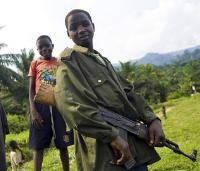KAMPALA, Uganda -- The bus destined for Gulu in northern Uganda hums and vibrates, its black exhaust pouring into Kampala's deserted downtown streets, as a woman draped in a green dress stands up in front and calls for a prayer.
Years ago, when Joseph Kony and his band of abducted child soldiers were still looting, maiming and terrorizing the north, prayer for this journey was essential. Yet three years after Kony's Lord's Resistance Army (LRA) were routed from northern Uganda -- chased into isolated stretches of jungle in South Sudan, the Democratic Republic of Congo (DRC) and the Central African Republic (CAR) -- prayer no longer carries the same urgency.
Uganda's war with the rebels began in 1986, but the conflict's seeds were sown by the colonial-era legacy of distrust and contempt between northern and southern tribes that remained after independence in 1962. Ugandan Presidents Milton Obote and Idi Amin both formed armies along their respective tribal lines, using extreme violence to cement their authority over the others. When President Yoweri Museveni, a southerner, took power in 1986, a resistance movement grew in the northern Acholi region that eventually manifested itself as the LRA.

